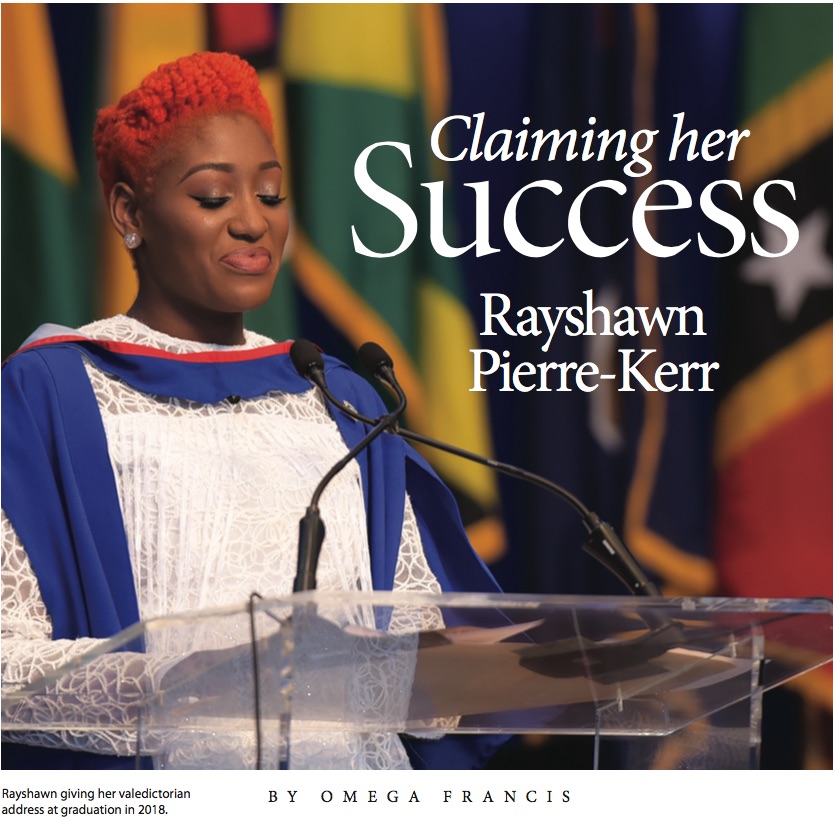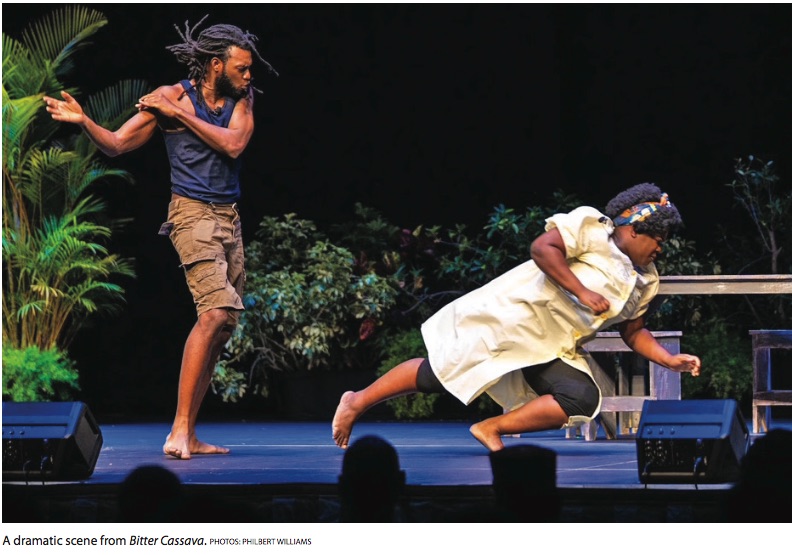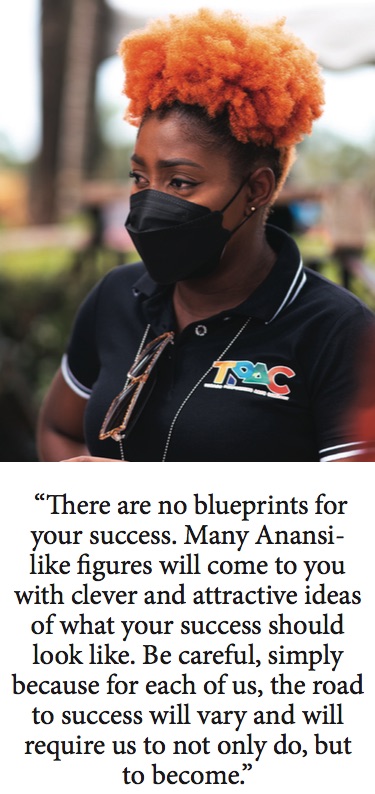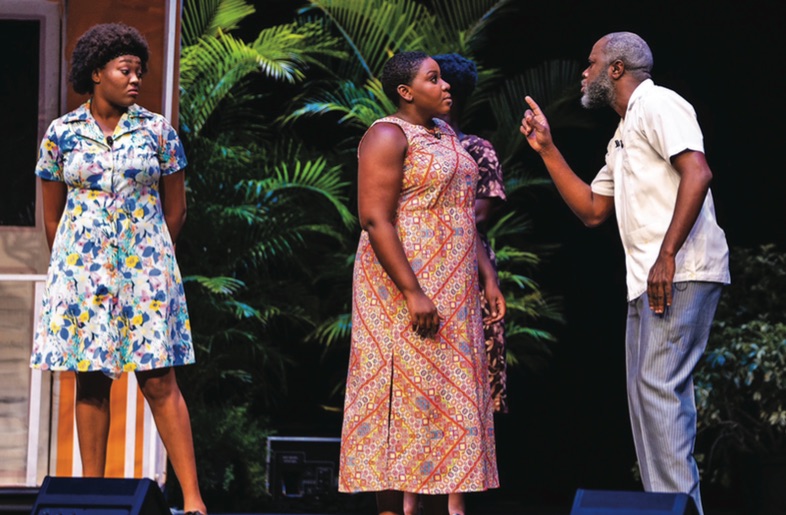
UWI 2018 Valedictorian, Ms La Reine Rivé 2017, Artistic Director of the Tobago Performing Arts Company, Director of the 2022 run of Bitter Cassava, wife, and mother – thirty-year-old Rayshawn Pierre-Kerr holds these and many other titles (and an entire cache of accolades), and is on track to garner more.
Born in Point Fortin, Rayshawn started living in Tobago with her family at a young age, and soon discovered her love for the stage. She wanting to be around the theatre, performing arts, and music, and this affinity was fostered early in her life. Her first stage experience was in 1999 at just 7 years old. All that was needed was a push from her primary school teachers. At the Pentecostal Light and Life Secondary School, librarian Merle Baird and teacher Jared Prima were both willing to provide financial support for her to represent the school in various competitions for the arts. This love further blossomed at Signal Hill Comprehensive (now Signal Hill Secondary), and from there, she looked towards The UWI.
At the Department of Creative and Festival Arts (DCFA), she pursued the Practitioner’s Certificate in Drama/Theatre in 2012, which she did on sponsorship from the Tobago House of Assembly. At the end of this certificate course, she was awarded the Samantha Pierre Award for Best Final Project, which positioned her to do incredible work in the community, and gave her the opportunity to write proposals to the UN and UNDP.
Later, she joined Arts-in-Action and was supported by Brendon La Caille and Patrice Briggs. Rayshawn soon saw the bigger picture; she saw what life after UWI would look like. With these experiences under her belt, she was motivated to continue forward to read for her double major degree in Theatre Arts and Carnival Studies, for which she earned first class honours. Grounded by her time at Arts-in-Action and encouraged by (director, educator and now Head of Department at DCFA) Louis McWilliams, Rayshawn decided to try her hand at directing. She directed JS Barker’s play Vulnerable Double and Dexter Musgrave’s Green Mango. From this, her love for directing was born. Through Arts-in-Action, she directed children’s theatre pieces and soon moved on to directing her first national play in 2018, Kevin Soyer’s Amazing Grace, and her own play, Salt: No Seasoning. The latter won her Best Director and itself Best Directed Production at the Prime Minister’s Best Village competition, and was featured in Carifesta 2019.
Inspired by her time at the DCFA, Rayshawn felt honoured to report back to work at the department as a part-time lecturer. She understood the importance, she recalls, of having someone who has experience in the theatre and performing arts to look up to while pursuing a degree. She sees her position within the department as an opportunity to let students know that there is a space for them and their voices. The DCFA is the place where they can sit and absorb, and figure out which “elder’s feet [they] would like to sit at to learn”.

While her journey towards directorial success and theatre arts prominence did manage to have a few meandering paths, everything she did has led her back to theatre and performance. Everyone in her life had several ideas of how she would attain success, from becoming a journalist to a politician, but as Rayshawn puts it, theatre had its own plans.
Her advice to her fellow 2018 graduates was this: “There are no blueprints for your success. Many Anansi-like figures will come to you with clever and attractive ideas of what your success should look like. Be careful, simply because for each of us, the road to success will vary and will require us to not only do, but to become.”
Becoming for Rayshawn means leaving her mark and her legacy, and telling the Trinbagonian and Caribbean stories that need to be told – stories like Bitter Cassava. Between her time at Tobago Heritage, spending time in class with Bitter Cassava playwright Dr Lester Efebo Wilkinson and individuals like performing arts educator Dr Dani Lyndersay, there was no chance that Rayshawn would have made her mark on the world in any other way than in the performing arts. Her time at the DCFA steeped her in performance and research, and inspired her love for Caribbean theatre, and Caribbean stories. Her love for Caribbean stories led her to try her hand at telling the story of Bitter Cassava differently. Not better; differently, because to her there can be no better. Originally produced as a student play at UWI in 2009 and directed by Louis McWilliams, it ran once again in 2016 at Carifesta with playwright Dr Wilkinson at the helm.

The story is narrated by the character who represents the archetype of the village elder. It is about Sam, who has a very typical Caribbean masculine superiority complex: the inflated ego and misogynistic ideals. Sam embodies aggressive, violent, and womanising behaviour in order to prove his “manliness”. Looking at it through a Tobago folkloric “lens”, Rayshawn was able to finesse the story and “illuminate the moments in the play where the mystery, magic and nuance of the folk take the lead”.
As a director, Rayshawn knew the story could be told differently and that is what she did. That was her driving force, to take this classic play that is as relevant now as it was 43 years ago, when it was written, and celebrate that which is beautiful, while highlighting the issues of Caribbean masculinities, misogyny, and violence.
She started with wanting to direct the play, wanting to share the story, and engage a team of people who would move the story forward. With responsibility over the Theatre, Dance and Movement Unit in the Tobago Performing Arts Company (TPAC), Rayshawn has always wanted to do a play where the range and variety of talent that exists in the company could be showcased, and Bitter Cassava fit the bill. However, putting together a production as esteemed as Bitter Cassava was no easy task. The first “cold reading” that was set up to get everyone’s feel for the play drew positive responses and this lead immediately to auditions and casting.
Next came the staging of the work, which saw them bounce between two different facilities for rehearsals. Engaging vendors to act as the supporting backbone for the play is also under the purview of the director, and Bitter Cassava had what Rayshawn called an “avalanche” of technical support from production managers, stage managers, costume designers, and more. The engagement of several talents across Tobago was necessary for the success of the play, as well as for ensuring that it had a Tobago feel. Her role overall as the director was one of engagement of the team, communicating the vision, inspiring people to want to tell the story, and connecting the story to themselves.
The successful run of Bitter Cassava is a proud moment for Rayshawn. She saw how hard everyone worked and how all of that translated onto the stage. As a young person, she is open to what she can learn from her team while also being a teacher. She recognises that so much of what she has been able to achieve in the directorial space would not have been possible without her coming through the ranks of the Tobago Heritage Festival, as well as the formal training and exposure she got from being at The UWI.

Rayshawn has not yet gotten over the high of Bitter Cassava’s successful run, but there is more work to be done. In her own words, she knows she should not “... confuse movement with progress. To achieve success, we must honour that which has been taught to us, that adding value to human existence is greater than simply making money.”
Currently pursuing a Master of Philosophy in Cultural Studies at The UWI, Rayshawn says she will continue to refine her skills, continue to make her mark, and leave her legacy. For her, a legacy for which her two children can be proud is important to leave behind.
“When you think about your own journey – where you go, how you transition – sometimes you think about living in it and seeing the people who are inside of it, but you have missed the opportunity to really credit the people in the background. A lot of what I have been able to do, knowing that the legacy that I leave when I pass on, whenever that is, is one that I want my children to be proud of. I have been able to accomplish a lot because I had the domestic support from my family.”